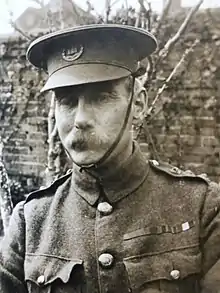Colonel The Right Honourable The Lord Ellenborough | |
|---|---|
 Law as lieutenant colonel in 1905 | |
| Member of the House of Lords | |
Lord Temporal | |
| as a hereditary peer 15 February 1916 – 22 January 1931 | |
| Preceded by | The 5th Baron Ellenborough |
| Succeeded by | The 7th Baron Ellenborough |
| Personal details | |
| Born | 23 November 1849 |
| Died | 22 January 1931 (aged 81) |
| Parents |
|
| Education | Wellington College, Berkshire |
| Alma mater | RMC Sandhurst |
| Profession | Military officer, peer and politician |
| Military service | |
| Years of service | 1869–1906 |
| Rank | Colonel |
Colonel Cecil Henry Law, 6th Baron Ellenborough, CB, DL (23 November 1849 – 22 January 1931), was a British Army officer and a member of the House of Lords.
Early life
Law was the third son of the Hon. Henry Spencer Law, a barrister who was the third son of the 1st Baron Ellenborough, and Dorothea Rochfort (daughter of Colonel J. S. Rochfort of Clogrenane, County Carlow). He was a nephew of Edward Law, 1st Earl of Ellenborough, and of Charles Law, a judge and Conservative Party politician.
He was educated at Wellington College, Berkshire, and the Royal Military College, Sandhurst, and passed out into the Army in 1869.
Military career
Law was commissioned as an officer into the 54th Regiment of Foot (from 1881 the Dorsetshire Regiment) in July 1869, was promoted to lieutenant on 28 October 1871, and served in the Second Anglo-Afghan War 1878–1880. Promoted to captain on 24 January 1883, to major on 21 June 1890, and to lieutenant colonel on 19 November 1897, he commanded the 2nd battalion Dorsetshire Regiment during the Second Boer War in South Africa from 1900 to 1902 where he was present during the Relief of Ladysmith, and the battles of Laing's Nek and the Tugela Heights.
For his services in the war, he was mentioned in despatches three times, received the Queen's Medal with five clasps and the King's Medal with two clasps,[1][2] and was appointed a Companion of the Order of the Bath (CB) in the April 1901 South Africa Honours list.[3][lower-alpha 1]
After the end of the war in June 1902, he returned to the United Kingdom in the RMS Dunottar Castle, which arrived at Southampton the following month.[5] Law was placed on half-pay in August 1902,[6] and retired with the rank of colonel in 1906.[7]
Family and later life
After his retirement from the British Army, Law took an active interest in local philanthropic and patriotic institutions. He was for many years Chairman of Dorset County Hospital and President of the Dorset Territorial Army Association.[1] In 1884, he married Alice Caroline Astell, daughter of John Harvey Astell of Woodbury Hall, Bedfordshire. She died in 1916.
Law succeeded to the Ellenborough barony on the death of his brother Edward in 1915. He was introduced to the House of Lords on 15 February 1916, immediately after that year's King's Speech.[8]
On his death in 1931, he was succeeded by his son Henry, who became the 7th Baron Ellenborough.
Ancestry
| Ancestors of Cecil Law, 6th Baron Ellenborough | |||||||||||||||||||||||||||||||||||||||||||||||||||||||||||||||||||||||||||||||||||||||||||||||||||||||||||||||||||||||||||||||||||||||||||||||||||||||||||||||||||||||||||||||||||||||||||||||||||||||||||||||||||||||||||||||||||||||||||||||||||||||||||||||||||||||||||||||||||||||||
|---|---|---|---|---|---|---|---|---|---|---|---|---|---|---|---|---|---|---|---|---|---|---|---|---|---|---|---|---|---|---|---|---|---|---|---|---|---|---|---|---|---|---|---|---|---|---|---|---|---|---|---|---|---|---|---|---|---|---|---|---|---|---|---|---|---|---|---|---|---|---|---|---|---|---|---|---|---|---|---|---|---|---|---|---|---|---|---|---|---|---|---|---|---|---|---|---|---|---|---|---|---|---|---|---|---|---|---|---|---|---|---|---|---|---|---|---|---|---|---|---|---|---|---|---|---|---|---|---|---|---|---|---|---|---|---|---|---|---|---|---|---|---|---|---|---|---|---|---|---|---|---|---|---|---|---|---|---|---|---|---|---|---|---|---|---|---|---|---|---|---|---|---|---|---|---|---|---|---|---|---|---|---|---|---|---|---|---|---|---|---|---|---|---|---|---|---|---|---|---|---|---|---|---|---|---|---|---|---|---|---|---|---|---|---|---|---|---|---|---|---|---|---|---|---|---|---|---|---|---|---|---|---|---|---|---|---|---|---|---|---|---|---|---|---|---|---|---|---|---|---|---|---|---|---|---|---|---|---|---|---|---|---|---|---|---|---|---|---|---|---|---|---|---|---|---|---|---|---|---|---|---|
| |||||||||||||||||||||||||||||||||||||||||||||||||||||||||||||||||||||||||||||||||||||||||||||||||||||||||||||||||||||||||||||||||||||||||||||||||||||||||||||||||||||||||||||||||||||||||||||||||||||||||||||||||||||||||||||||||||||||||||||||||||||||||||||||||||||||||||||||||||||||||
Notes and references
Notes
- ↑ The award was dated 29 November 1900; he only received the actual decoration from King Edward VII at Buckingham Palace on 24 October 1902.[4]
References
- 1 2 "Obituaries". The Times. 24 January 1931.
- ↑ Hart's Army list.
- ↑ "No. 27306". The London Gazette. 19 April 1901. p. 2697.
- ↑ "Court Circular". The Times. No. 36908. London. 25 October 1902. p. 8.
- ↑ "The Army in South Africa: Troops returning home". The Times. No. 36814. London. 8 July 1902. col c, p. 11.
- ↑ "No. 27462". The London Gazette. 8 August 1902. p. 5099.
- ↑ Kidd, Charles (editor). Debrett's Peerage and Baronetage (2015 edition), p. 419.
- ↑ "The Kings Speech (1916)". Parliamentary Debates (Hansard). House of Lords. 15 February 1916. Retrieved 18 June 2023.